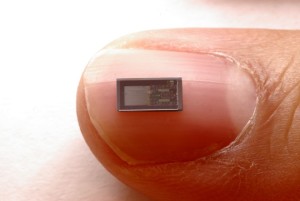 The Atlantic has a really interesting article about doctors in the Midwest working on pressure sensors that can be implanted in patients’ brains, and which are absorbed by the body after they’re no longer useful. From the article:
The Atlantic has a really interesting article about doctors in the Midwest working on pressure sensors that can be implanted in patients’ brains, and which are absorbed by the body after they’re no longer useful. From the article:
It consists of a membrane made from PLGA, a polymer regularly used in medical devices, suspended in a frame of silicon and magnesium. The pressure of the surrounding fluid causes the membrane to bend, which changes the electrical resistance of an adjoining silicon sensor.
Sounds particularly interesting, and the device is undergoing animal trials. Doctors hope to start human trials in three to five years.
The sensor is only part of the problem, of course. It needs to be powered, and the data needs to be transmitted wirelessly. For now, power and radios are put in less sensitive parts of a patient’s body, and dissolve about 85 percent. They’re working on it.